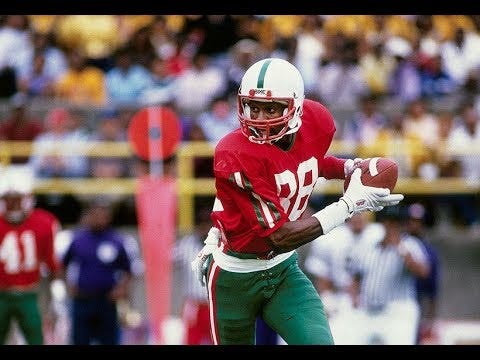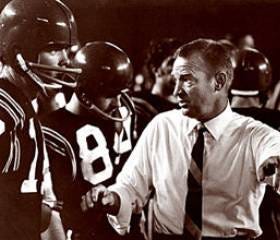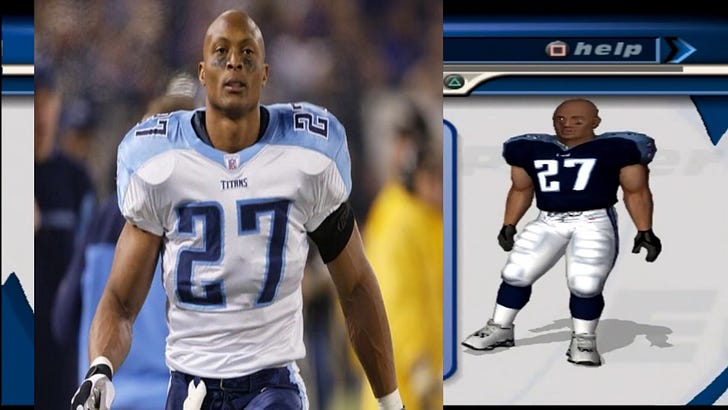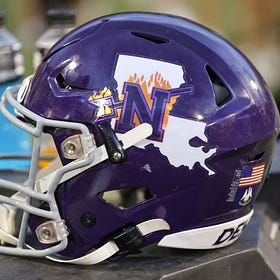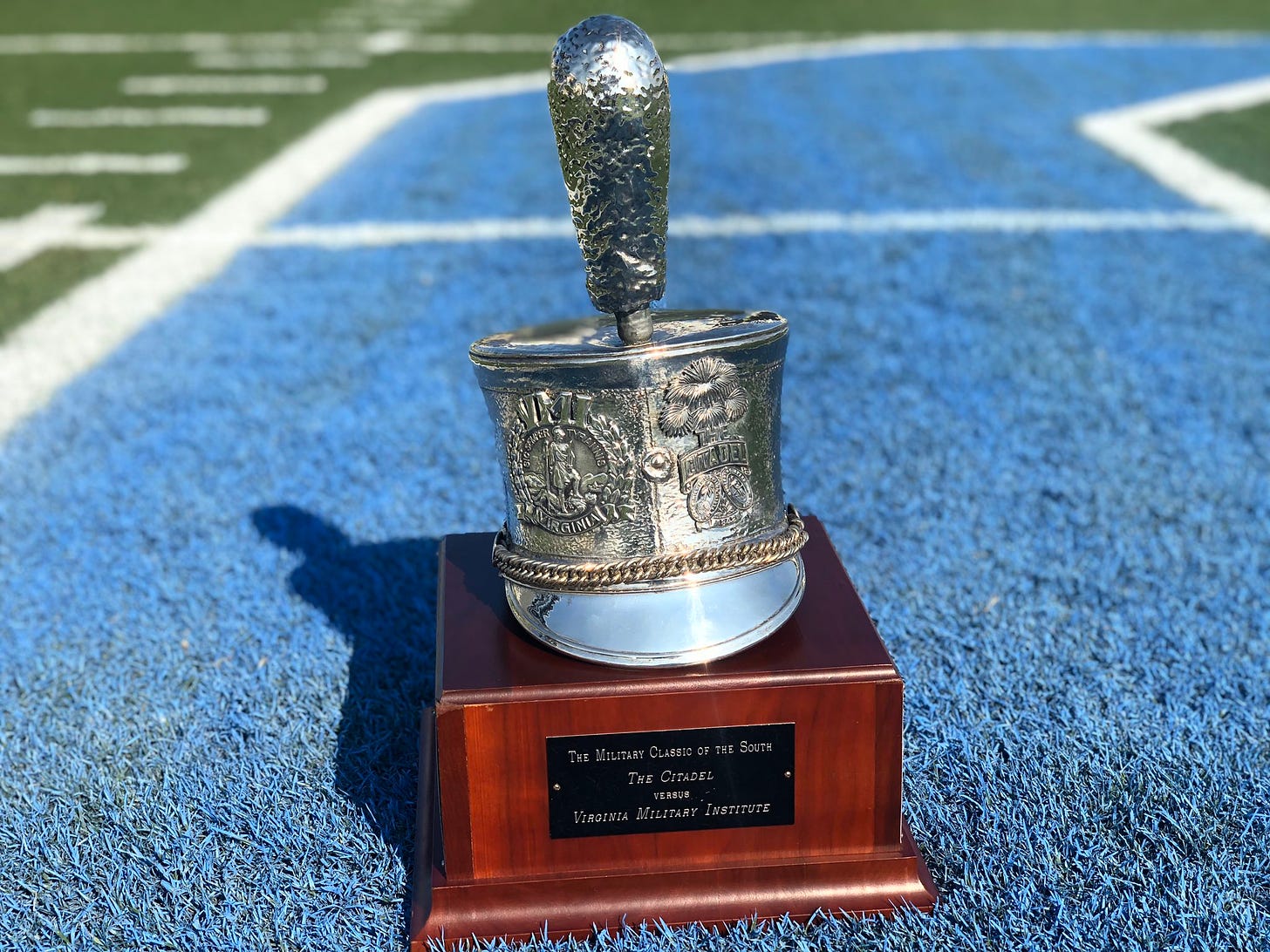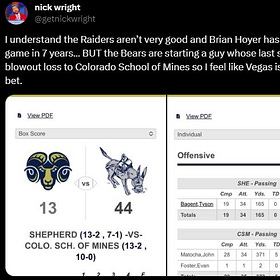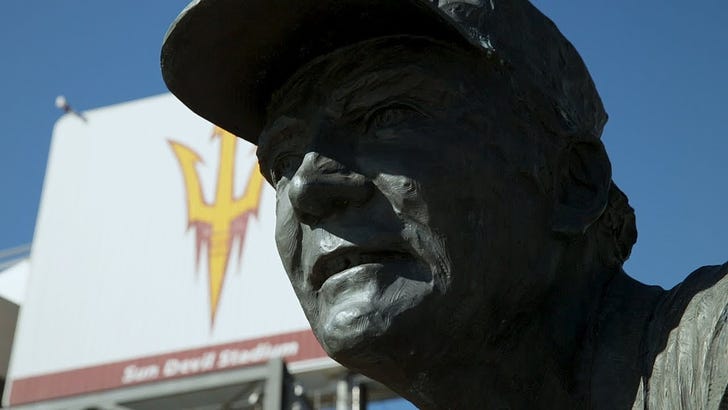Five for Friday: The Agony of Defeat
Five games in Week 8 of the FCS schedule feature winless teams. Every 0-for season tells a unique story.
Forty years ago, the Mississippi Valley State Delta Devils were at the forefront of transforming college football forever. MVSU averaged 57 points per game employing a wide-open passing offense years ahead of its time.
The Satellite Express tandem of Willie Totten at quarterback and wide receiver Jerry Rice rewrote record books with a scheme that had very few contemporaries; BYU won the national championship at the Div. I-A level this same season employing its own revolutionary offense under LaVell Edwards, Portland State’s Run-and-Shoot overseen by Mouse Davis and both Don Coryell and Bill Walsh experienced success in both the college and pro games with their innovative aerial attacks.
California's Cradle of Coaches Shaped College Football History
Tucked away in the mountainous part of northeast Los Angeles County is a cluster of smaller universities, renowned for their academics. These are schools known for producing celebrated professionals in a variety of fields — among them former presidents Barack Obama (Occidental) and Richard Nixon (Whittier).
Still, it was an exclusive club MVSU belonged to, and the Delta Devils may have been the most exciting of the bunch. It was intriguing enough that Satellite Express garnered national attention, including Sports Illustrated. Eleven years before it declared to “Hand Him The Heisman” for another SWAC legend, SI dedicated several pages to MVSU’s budding star Rice.
Credit the publication for being in early on someone who went on to become the greatest receiver in NFL history. Also, a nod to this telling cutline that reads, “Life isn’t fancy at Mississippi Valley, but the football is thanks to the Gunslinger.”
This note about MVSU is a very subtle, perhaps even unintentional insight into the meager budgets with which HBCU programs have to work. No budget in Div. I football is more meager than MVSU’s, which is the lowest in the Football Championship Subdivision.
The school’s lack of resources are an unlining issue for a program that has been mostly woeful in the four decades since the Satellite Express lit up scoreboards. MVSU finished above .500 twice in the 21st Century to date, last doing so in 2006.
For as much as the Delta Devils have struggled in the last 40 years, though, there’s been only one winless season for the program amid a smattering of one-win finishes. That note sets the scene for MVSU’s 0-for vs. 0-for showdown in Week 8 vs. SWAC counterpart Bethune-Cookman.
Bethune-Cookman at Mississippi Valley State
MVSU welcomes BCU to the venue sporting the name of its famous duo — Rice-Totten Stadium — with one team guaranteed to leave a winner for the first and perhaps only time in 2024.
The Delta Devils are 0-6, having lost by an average of 34.8 points per game. After a relatively promising 28-14 defeat in Week 2 at Lamar, a Southland Conference program that’s spent time in the STATS FCS Top 25 this season, MVSU lost its next two games to Murry State and Nicholls by a combined 125-8 margin.
Bethune-Cookman’s had a somewhat smoother path to 0-6, having lost two games by less than a touchdown including the Wildcats’ SWAC opener vs. Alabama State. The 26-21 home loss to ASU came one week after BCU dropped a 38-37 heartbreaker — albeit to Div. II opponent Clark Atlanta.
Nevertheless, Bethune-Cookman has been more competitive than MVSU this season and will likely send the Delta Devils to an 0-7 mark. A win offers BCU a needed break from what’s been a difficult stretch for that program.
Bethune-Cookman generated some national buzz following the 2022 season when it hired, but never finalized contract negotations, with Hall of Fame defensive back Ed Reed.
Reed’s hire continued the limited trend of HBCU programs tabbing big-name former pros as head coaches. To avoid turning this into a tangent on Deion Sanders, who consumes enough of the oxygen around the sport now as it is, I’ll spare you my thoughts on the ethical issues tied to Jackson State hiring Sanders in the aftermath of Prime Prep’s collapse. We can just say that with two SWAC championships, Jackson State won in Sanders’ tenure and move onto Eddie George at Tennessee State.
TSU stumbled down the stretch in 2023, but the Tigers produced the Buck Buchanan Award winner, Terrell Allen. Midway through 2024, TSU leads the Big South/OVC conglomeration and could reach its first playoff since 2013.
The Former Legendary Player Thriving As An HBCU Head Coach
Few football coaches ever won the Heisman Trophy. Even fewer graced the cover of Madden.
Which is to say that HBCU programs going this route hasn’t gone badly; it’s certainly been a more fruitful experiment than UAB hiring Trent Dilfer as its head coach.
The exception is Reed, who never actually came to BCU. Reed’s historically short tenure never saw the legendary Miami Hurricane/Baltimore Raven put pen to paper, and it ended with Reed having viral eruptions on BCU leadership and funding.
The context and manner in which the message was delivered perhaps obfuscated a legitimate issue: HBCUs face an uphill climb when it comes to funding, facilities, visibility and so on.
It doesn’t help that many HBCUs are in states with political leaders who openly abhor education. When The New York Times chronicled the plight of Grambling athletics in 2013, Bobby Jindal led an assault on the state of Louisiana’s schools.
BCU being in Florida is up against an even more daunting political landscape currently. The Sunshine State’s governor, Ron DeSantis, has been openly hostile toward education, going so far as to politicize the very existence of an instution, New College.
Craig Meyer’s excellent The Front Porch took a deep-dive into the leveraging of college baseball in New College’s reformation as an arm of the DeSantis-led government. In Florida’s current vision for college education, it’s difficult to imagine an HBCU like Bethune-Cookman having any support at the state level.
Northwestern State at Nicholls
Another winless pairing in the FCS last week saw Texas A&M Commerce beat Northwestern State, 42-21. You may recall that I noted the significance of Northwestern State taking the field to open 2024, marking the program’s return from a uniquely rotten situation.
Exorcizing Demons: Northwestern State Football Returns After Tragedy
Thursday night’s most noteworthy contest was one played in relative obscurity. Its significance had nothing to do with the 62-28 final score.
The next major hurdle for NSU is getting that first, elusive win. It’s been almost two calendar years since the Demons knocked off A&M Commerce on Nov. 5, 2022.
The 0-7 Demons face Nicholls on Saturday having lost by an an average of 34 points per game. NSU played a tough SEMO team to a 19-0 final on Sept. 28, and were within two points of Prairie View A&M in the fourth quarter of a 37-31 loss. But otherwise, it’s been tough sledding in the Demons’ restart.
The Citadel at VMI
The most visible military rivalry in sports, and perhaps the most recognizable rivalry in the sport period, could be for a College Football Playoff berth in 2024. Both Army West Point and Navy are undefeated and ranked in the Top 25 heading into the back half of their respective schedules.
It’s been a much more trying season for FCS military schools The Citadel and VMI. The Southern Conference rivals meet for the 80th time in a series dating back to 1920 and played for one of the best rivalry trophies in college football, the Silver Shako.
Although VMI won a 17-13 decision last year in Charleston, claiming the Silver Shako for the third time in the last five installments of the Military Classic of the South, it’s been almost all The Citadel since 2003. Those three losses in 2019, spring 2021 and last season are the Bulldogs’ only setbacks against the Keydets in the last 20 years.
The Citadel will likely reclaim the Silver Shako in 2024 despite its underwhelming 2-5 overall start and 0-4 mark in the SoCon. The Bulldogs visit a VMI team that is 0-6 in its second season under head coach Danny Rocco.
Rocco came to VMI with solid FCS coaching credentials. He led Liberty to Top 25 finishes in four consecutive seasons and would have made the Playoffs had the Big South Conference earned an auto-bid during Rocco’s tenure.
Rocco coached teams at Richmond and Delaware that did make the Playoffs, including his overseeing a semifinalist at both programs. Winning at VMI is a whole other challenge, though.
The Keydets have won just one SoCon title in the last 46 years, doing so in the truncated spring 2021 season. That’s the only time VMI ever reached the FCS Playoffs.
VMI’s short-lived success offers a window into the challenges inherent with running a program at a military school, and why these teams so often rely on something of a plug-and-play option system.
The 2020/2021 Keydets operated with an air raid-inspired offense. Among other things, finding the caliber of skill-position players who thrive in such a scheme, particularly at quarterback. Keeping a capable passer is another challenge, which VMI discovered with the transfer of Seth Morgan.
Morgan landed at Div. II Shepherd University, where he admirably followed in the footsteps of record-setting passer and current Chicago Bear Tyson Bagent.
Tyson Bagent, Harlon Hill and A Quick History of Div. II Football
OK, so let me level with you before jumping into this edition of The Press Break: I’m breaking a personal rule of mine writing this newsletter entry. At least, sorta.
Morgan is now at New Hampshire where earlier this season he tied the program’s single-game passing touchdown record — an impressive feat in an offense that Chip Kelly once ran. And he’s not the only figure responsible for VMI’s lone playoff appearance now flourishing in CAA football.
Billy Cosh, offensive coordinator at VMI that spring season, rejuvenated a struggling Richmond team as the Spiders coordinator. He’s now the head coach at Stony Brook, which Cosh has at 4-2 after the Seawolves finished winless a season ago.
Marist at San Diego
The Pioneer Football League is a fascinating conference. Long before TV motivated the Big Ten to span from New Jersey and Maryland to California and the Pacific Northwest, the PFL extended from San Diego to Iowa and Indiana in the Midwest; Ohio in the Rust Belt; down south to the Carolinas and Florida; and north to New York.
Back in my days as an ESPN Page 2 freelance contributor, I pitched a feature that they passed on which was to cover the University of San Diego football team traveling what amounted to the circumference of the planet one season for conference games.
Now, the PFL isn’t so expansive in the pursuit of media-right riches. Fielding programs at the FCS level in general isn’t going overload the coffers, hence athletic departments at such schools as Missouri State and Kennesaw State making the quizzical decision to chase the FBS dragon.
Rather, the PFL is an invention of necessity. The conference features programs from private universities, all of which are non-scholarship. Among them is Poughkeepsie, New York-based Marist.
The Red Foxes make embark on a stretch in which three of their next four games are on the road, taking them to San Diego; Des Moines, Iowa, to face Drake; and to Stetson, located about midway between Orlando and Daytona Beach in DeLand, Florida.
Sandwiched in between is Marist’s Homecoming game against Valparaiso. Although the Beacons are 2-4, they’re Marist’s best hope of a win on the Red Foxes’ remaining schedule; Valpo’s two wins came in a 20-17 defeat of NAIA program Indiana Wesleyan and a double-overtime decision against Roosevelt University, in its first year of NCAA Div. II membership after moving up from NAIA.
Until then, Marist takes an 0-6 mark into its longest trip of an all-around hectic travel schedule.
Austin Peay at Utah Tech
Not long ago, Austin Peay was unequivocally the worst program in college football. The Governors endured back-to-back winless seasons in 2015 and 2016, another in 2013, and won just a single game in 2014.
Beginning in 2017 with an absolutely stunning 8-4 campaign, however, Austin Peay began an ascent that by 2019 landed the Govs in the FCS Playoffs and an end-of-season ranking of No. 8. Austin Peay returned to the Playoffs last season, winning the inaugural United Athletic Conference championship, before taking Chattanooga to the brink in a 1st Round matchup.
That’s all to say a program can climb from the absolute nadir, and it can be done in relvatively short order. 0-7 Utah Tech’s situation isn’t comparable to Austin Peay’s a decade ago, in part because the fledgling Div. I program is in only its fourth full season since moving up from Div. II.
The Trailblazers have, however, experienced season-to-season regression from four wins in 2022 to two in 2023. Utah Tech is also dealing with the trickle-down effects of conference realignment that impact FCS programs.
The Trailblazers moved up from Div. II tabbed to restore football to the Western Athletic Conference. The once-influential and successful conference ceased football operations in 2012 after a steady decline, the nature of which I will continue1 to examine in the current portion of the Dead Conferences series.
Dead Conferences Part 2, Chapter 2: Frank Kush and Arizona State Start A College Football Fiesta
Five years before the formation of the Western Athletic Conference, Arizona State completed its best season in the program’s history to that point with a 47-7 decimation of rival Arizona. The blowout capped a perfect, 10-0 season for the Sun Devils in which they dominated all comers by an average of 33.1 points per game.
While much different than the WAC of old, a revamped FCS conference made up of assorted Western-state and Texas programs was announced in 2021. It ended almost immediately.
What was to become the WAC is now the UAC, made up primarily of members from the almost-as-short-lived ASUN football. That means Utah Tech’s conference now includes Georgia, Arkansas, Kentucky and Tennessee, leaving the Trailblazers and nearby Southern Utah as far-flung outposts.
These Dead Conferences chapters take considerable time to produce. Apologies for the delay, but Chapter 3 on the WAC is on its way.

